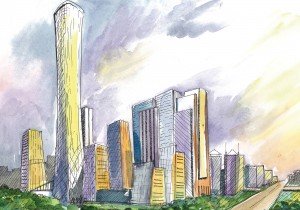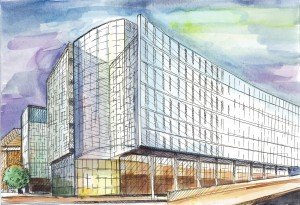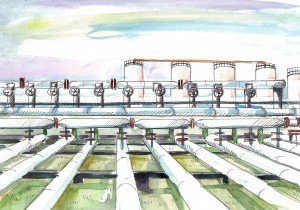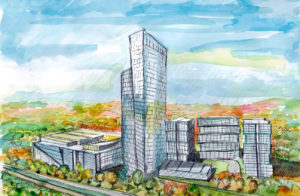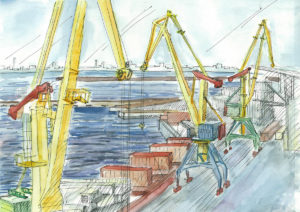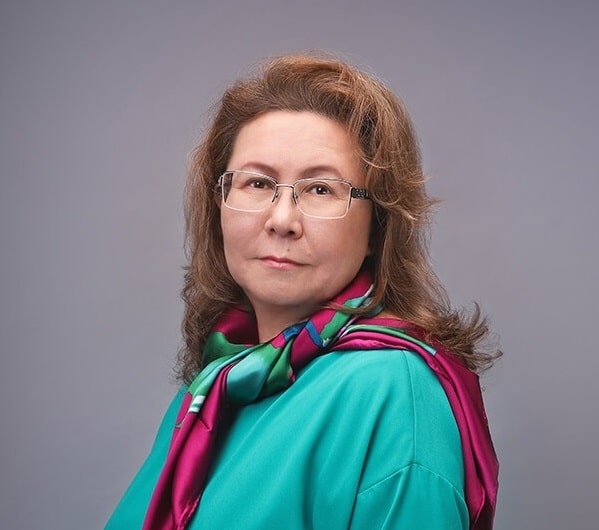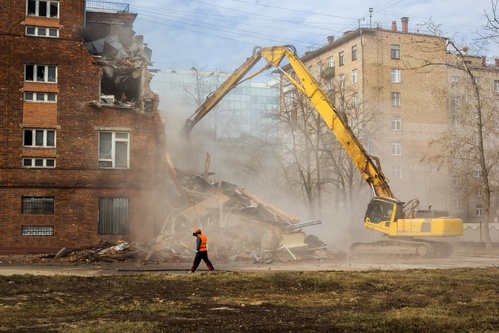
According to the Art. 33.3.7 the Law About Architectural, Urban planning and Construction Activity the Chief state construction inspector of the Republic of Kazakhstan and its deputies, as well as the chief state construction inspectors of areas, the cities of republican value, the capital, has the right to consider issues on administrative offenses and impose administrative penalties. In the cities of Almaty and Astana it is a Department of State Architectural and Construction Control of the city (hereinafter referred to as SACC).
Starting April 1, 2015 approach to control of construction in Kazakhstan is changed. Theretofore SACC could leave on check practically at the slightest pretext, now SACC does it only in the presence of information of technical supervision on the revealed violations and inquiries of the customer, as well as persons, who has impact on building of this property.
The bases for application of restrictions on construction process and demolition of the constructed building will be violations of the law in the field of architecture and urban planning, which provides administrative or criminal liability.
The carrying out inspection.
Check of construction facility is carried out according to the Laws of the Republic of Kazakhstan About the state control and supervision in the Republic of Kazakhstan (hereinafter referred to as the Law about supervision) and the Law about architectural, urban planning and construction activity (hereinafter referred to as the Law ATCA).
The control authority and supervision is obliged to inform in writing the checked subject on the beginning of carrying out check not less than in thirty calendar days prior to the check with the indication of terms and a subject of carrying out inspection.
During unscheduled inspection authority is obliged to inform the checked subject not less than in a day before the check with the indication of a subject of carrying out check. (Art. 19.1 of the Law about supervision).
According to the Art. 19.2 the Law about supervision, the officials of government bodies who arrived for inspection to property are obliged to show:
- the act of purpose of inspection with a registration mark of authorized body on legal statistics and special accounts;
- service certificate (official ID);
- If appropriate permission of competent authority to visit sensitive sites;
- the medical admission, which is necessary for visit of the corresponding property, given out in the order established by authorized body in the field of health care;
- test list.
The beginning of carrying out check is a date of delivery to the subject of check the act of purpose of check appointment. An inspection can be carried out only by that official (person) who is specified in the act of purpose of check. Thus the structure of the officials who are carrying out an inspection can be changed according to the decision of control authority and supervision on what the checked subject and body for legal statistics and special accounts prior to participation in check of the persons which aren't specified in the act of purpose of check with the indication of the reason of replacement are notified. (Art. 19.4 of the Law about supervision).
At identification of the committed violations, bodies of the state architectural and construction control and supervision issue instructions (according to the Art. 31-1.4 of the Law about supervision) about:
- prohibition of use of the construction materials, products, projects and the equipment which aren't comply with national standards and specifications;
- elimination (repair) by the customer (employer) and (or) by the contractor of the founded violations in prescribed periods;
- installation and construction works suspend.
The Art. 20.1 the Law about supervision provides that the term of carrying out check is established taking into account the volume of the forthcoming works, and objectives and should not exceed:
- for subjects of microbusiness - five working days,
- for subjects of small, average and large business, as well as for the checked subjects which aren't subjects of private business - thirty working days.
The term of carrying out the inspections, which are carried out in the field of observance of the labor legislation of the Republic of Kazakhstan regarding to the safety and labor protection on construction facilities taking into account its technical complexity:
- Technically complex facilities - no more than five working days with possible extension up to additional five working days;
- Non-technically complex facilities - no more than 4 hours of the working day and with possible extension till 8 o'clock of the working day.
In need of carrying out special researches, tests, examinations, as well as connection with the considerable volume of check the term of carrying out, the check can be prolonged only once by the head of control authority and supervision (or by acting head of control authority and supervision) for the term of no more than thirty working days.
In case of extension of review periods the government body without fail makes out the additional act of extension of the check with registration in authorized body on legal statistics and special accounts in which number and date of registration of the previous act of purpose of check and the extension reason are specified.
The inspection can be suspended once for the term of no more than one month. The notice of the checked subject of stay of check is made in one day prior to stay or renewal of check with the notification of authorized body on legal statistics and special accounts. At stay or renewal of inspection, the act of stay or renewal of inspections is taken out.
In case of refusal in adoption of the act of purpose of inspection or hindrance to access for the official of the control authority and supervision, which is carrying out check to the materials necessary for carrying out check, the protocol is formed. The official of control authority and supervision who is carrying out inspection and the authorized officer of the checked subject sign the protocol. The authorized officer of the checked subject has the right to refuse signing of the protocol, having offered a written explanation about a cause of failure. Refusal of obtaining the act of purpose of inspection isn't the basis for inspection cancellation (Art. 19.3 of the Law about supervision).
The basis of imposing of an administrative penalty.
The Code of RK about administrative violations contains such bases:
- The violation of requirements of the approved construction norms specified in chapter 5 of the Law ATCA (see comment) and project documents by production construction and rescue and recovery operations, which caused deterioration of operational qualities, decrease in durability, stability of buildings, structures, their parts or separate constructive elements.
Comment. The construction norms and rules specified in chapter 5 of the Law ATCA:
- state urban planning standards and regulations;
- technical regulations on construction of facilities;
- the state construction norms and rules, construction norms, sets of rules on construction;
- normative documents on standardization in the sphere of construction activity;
- the republican leading documents in construction;
- standards of the state architectural and construction control and supervision;
- standards of other bodies of the state supervision in construction;
- interstate construction norms and rules;
- interstate standards in construction;
- the interstate set of rules on project and construction;
- Production construction, construction, rescues and recovery operations at construction and reconstruction of property without the project documentation approved in accordance with the established procedure;
- Construction of facilities and its complexes without project (project and budget) documentation or according to the project (project and budget) documentation which didn't pass in accordance with the established procedure of the examination on which carrying out is required;
- Illegal building of production, inhabited, economic, hydro technical (water management) or household objects without the corresponding right for the land*;
- Illegal construction of buildings, constructions and other property on the water protection zones and strips, as well as illegal change of the natural course of the river*.
The main type of responsibility is the penalty or deprivation of the license. The second type of punishment is applied to repeated attraction to administrative responsibility.
Marked with an asterisk above the basis attract both imposing of a penalty, and forced demolition, i.e. two types of punishment (the main and additional) at the same time.
Compulsory demolition of illegally built or built structure is imposed by the judge in administrative process. In other words, it is requires resolutions of administrative court to demolish illegally built or built structure forcibly.
The resolution of court on compulsory demolition of illegally erected or constructed building is executed by a person, who received an administrative penalty. In case of non-execution of the administrative penalty imposed by court in the form of compulsory demolition of illegally built or built structure voluntary the resolution is carried out as executive production by authorized body.
In any cases, the compulsory demolition of illegally ongoing construction or finished building are carried out at the expense of the violator.
Regulatory framework applied:
- Code of the Republic of Kazakhstan on Administrative Offences, July 5, 2014 №235-V;
- Law of the Republic of Kazakhstan №242-II About Architectural, Urban planning and Construction Activity, July 16, 2001;
- Law of the Republic of Kazakhstan About the state control and supervision in the Republic of Kazakhstan.
Prepared by Managing Partner Artyushenko Andrey, 28.09.2015
For the Magazine Tax and Law, num.9 (111), September 2015.


